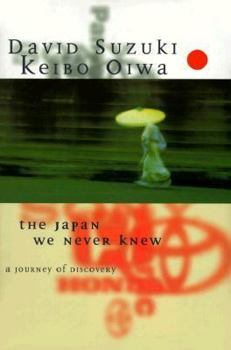The Japan We Never Knew: A Voyage of Discovery
Select Format
Select Condition 
Book Overview
No Synopsis Available.
Format:Hardcover
Language:English
ISBN:0773729844
ISBN13:9780773729841
Release Date:January 1997
Publisher:Stoddart
Length:324 Pages
Weight:1.56 lbs.
Dimensions:1.1" x 6.4" x 9.6"
Related Subjects
Asia Cultural History Japan Politics & Social Sciences Social Science Social Sciences WorldCustomer Reviews
2 ratings
A useful but sobering bit of reading
Published by Thriftbooks.com User , 23 years ago
Abe-san's review elsewhere on this page focuses on the treatment of the Ainu in Hokkaido -- Japan's indigenous people -- and indeed, this is one of the issues that Suzuki and Oiwa's work takes up; but it IS only one of the issues. Suzuki, for those of you who don't know, is a Japanese Canadian who, like many others, was forcibly relocated with his family as a child during the Second World War. The Canadian government, in a move they since have apologized and made token reparations for, confiscated the property of all persons of Japanese ancestry on the west coast and sent them into the interior of the province to camps, similar to Manzanar in California. Suzuki, driven to excel by these experiences, to prove himself as a Canadian, grew up to become a political activist and passionate environmentalist (and TV celebrity, university professor, etc). Oiwa, the co-author, believed himself ethnically Japanese until discovering that his father was a Korean -- a revelation, since Koreans are not treated as equals by some Japanese, and there are enduring tensions from the days when Japan occupied Korea. Together, the two writers travelled to Japan to probe into many current political problems, with considerable concern for the environment and aboriginal issues, but also dealing with political problems in Okinawa, the tendancy in some circles in Japan to deny guilt for war atrocities, the treatment of the burakumin, Japan's "untouchable class," and issues that spring up from the Japanese concern for treating "outsiders" differently from "insiders" (Japanese who grew up in South America are interviewed, for example, about being treated like outsiders in their own country). Everything they write is supported by excellent interviews. The emphasis of the book is NOT on criticising the Japanese right or such, however, but rather speaking with people in Japan who are fighting to change things -- including Katsuichi Honda, a controversial author who has written a substantial book on the Nanking Massacre (and who actually visited China for purposes of research). Suzuki's main concern in his work has been the environment, so much attention is given to farmers experimenting with alternative, back-to-nature methods of farming - more than interested me, but environmentalists might feel otherwise. I'd recommend this book for anyone concerned about Japan.
Excellent antropological view of native cultures in Japan
Published by Thriftbooks.com User , 25 years ago
This is a book about the Japan that even Japanese urbanities unfortunately do not know. I recommend it for anybody seriously interested in the anthropology of the different native people of Japan and their heritage. It is easy to read and first hand report. I felt touched by the interviews. However, to have a whole picture, I suggest to read it after you know the stereotypes of Japan that are written in most of introductory books in the market, or better, after you live there for some time. I have read other books about indigenous people of other lands, and many times I finish with sadness, for the loss of their treasures and way of life. Preface of this book mentioned something that I felt very valuable. It said that Mr. Suzuki purported to show that such native people may provide a clue to the future, to our survival. I appreciate your message very much, Mr. Suzuki.





